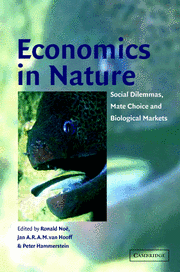Book contents
- Frontmatter
- Contents
- List of contributors
- Preface
- Acknowledgments
- 1 Games and markets: economic behaviour in humans and other animals
- Part I Economic behaviour in social networks
- 2 Social dilemmas and human behaviour
- 3 Cooperation and collective action in animal behaviour
- 4 Conflict, reconciliation and negotiation in non-human primates: the value of long-term relationships
- Part II Biological markets
- Part III Mating markets
- Index
4 - Conflict, reconciliation and negotiation in non-human primates: the value of long-term relationships
Published online by Cambridge University Press: 04 August 2010
- Frontmatter
- Contents
- List of contributors
- Preface
- Acknowledgments
- 1 Games and markets: economic behaviour in humans and other animals
- Part I Economic behaviour in social networks
- 2 Social dilemmas and human behaviour
- 3 Cooperation and collective action in animal behaviour
- 4 Conflict, reconciliation and negotiation in non-human primates: the value of long-term relationships
- Part II Biological markets
- Part III Mating markets
- Index
Summary
The despotic society model
In 1932 an English zoologist, the later Sir Solly Zuckerman, published a book entitled The Social Life of Monkeys and Apes. It was based to a large extent on his studies of the social behaviour and relationships in a colony of hamadryas baboons (Papio hamadryas) in the London Zoo. This book would influence the scientific view on animal societies for a long time to come. Zuckerman painted a rather grim picture of this baboon society. He emphasised its despotic character. Despotic dominance relationships were maintained by severe, sometimes lethal, aggression and bullying, and were expressed in sexual violence and raping. Sexual drive was supposed to form the main cohesion factor. Sexual presenting, typically a female solicitation behaviour, but also used by subordinate males, was supposed to function as a submissive means to avert violence and the tensions of conflict. We now recognise this picture as a caricature. The situation was caused by the unnatural, and – one might say – even pathological condition of this colony. The hamadryas baboons had been collected from the wild and had been put together in the zoo, without due regard for the natural growth and for the history and maturation of their social relationships.
The complexity of natural social organisation
The hamadryas baboon has a rather peculiar social organisation, unlike that of many other primates (Kummer 1957, 1968). In the wild these baboons live in large groups with a multilayered structure. The basic units are formed by harems, in which, as a rule, a single adult male herds a few females and their offspring. In the barren desert environment in which this species lives, these harems are the basic foraging units.
- Type
- Chapter
- Information
- Economics in NatureSocial Dilemmas, Mate Choice and Biological Markets, pp. 67 - 90Publisher: Cambridge University PressPrint publication year: 2001
- 6
- Cited by



